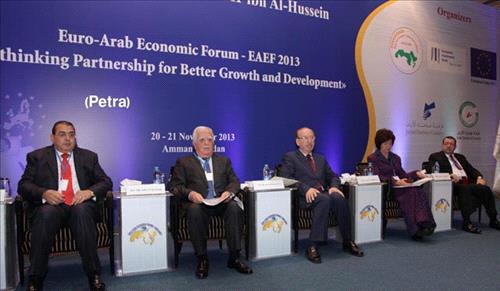Ammon News - JORDAN TIMES - AMMAN — Industry, Trade and Supply Minister Hatem Halawani on Wednesday said Jordan was facing “huge” challenges, mainly the scarce resources and regional unrest, which is draining the country’s capabilities.
During the opening of the 2nd Arab-European Economic Forum, which he attended on behalf of His Majesty King Abdullah, the minister added that hosting more than one million Syrian refugees imposes burdens on the Kingdom’s infrastructure, such as water, health, education, food and budget.
“The cost of hosting Syrians in Jordan is estimated to reach more than $2 billion by the end of this year,” he indicated, noting that the upcoming two years will have bigger consequences if the Syrian crisis was not resolved.
Halawani stressed that Jordan has managed to an “attractive” and “competitive” investment environment despite the challenges through building on its strengths, including security, stability, democratic and political reforms and geographical location.
In addition, he said the development zones and “modern” legislation have enabled cash movement and maintained a “solid” banking system, a corridor that opens the door for private investments, especially in ICT, energy and mining.
Highlighting economic programmes implemented by Jordan, Halawani noted that Jordan’s policies have led to “positive” results.
“The Kingdom is moving in the right direction with gross domestic product growing more than threefolds, reaching $31 billion last month up from $8.5 billion in 2000,” the minister said.
He called for more efforts to boost economic cooperation between Arab countries and the European Union (EU) to benefit from the “valuable” investment opportunities in the region.
Halawani pointed out that Jordan is committed to continue developing the infrastructure, citing the railway project to link the Kingdom with neighbouring Arab countries, Turkey and Europe as an example of schemes that increase the opportunities of trade.
The minister also highlighted initiatives being implemented to encourage small- and medium-sized enterprises to work opportunities and contribute to combating poverty and unemployment.
Adnan Kassar, chairman of the General Union of Arab Chambers of Commerce, Industry and Agriculture, noted that Jordan is one of the pioneering countries in the region in terms of economic reform, gaining the interest of international and Arab companies and businesspeople.
EU Ambassador to Jordan Joanna Wronecka commended Jordan’s “moderation” model, pointing out that the global financial crisis, which hit European countries, and the political unrest in the region have increased challenges facing economic cooperation between the two sides.
Director General of the Arab Investment and Export Credit Guarantee Corporation Fahad Rashid Ibrahim estimated the Arab-European investment volume at around $234 billion by the end of 2011.
